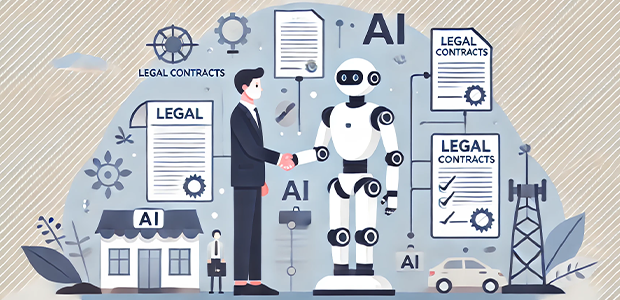
Why Legal Contracts Are Essential for AI Integration in Business Operations
The adoption of AI has fundamentally reshaped how businesses function, and is revolutionising the way organisations operate and innovate.
From automating routine tasks to vast datasets, AI technologies hold immense potential to drive efficiency, productivity, and competitive advantage. However, amid the excitement surrounding AI adoption, businesses need to recognise the important role which legal contracts play in safeguarding their interests and ensuring the responsible deployment of AI solutions.
Before going into the specifics of legal contracts, it is important to understand the relationship of AI integration within the business context. AI encompasses a diverse array of technologies, including machine learning, natural language processing, computer vision, and robotics, among others. These technologies enable machines to mimic human cognitive functions, such as learning, reasoning, and problem-solving, leading to a wide range of applications across industries.
As businesses embark on their AI journey, they encounter a myriad of legal considerations and challenges. These include issues related to intellectual property rights, data privacy and security, contractual obligations, regulatory compliance, and ethical implications. Without proper legal safeguards in place, organisations risk facing potential liabilities, disputes, and reputational damage could undermine the success of their AI initiatives.
One of the foremost concerns in AI integration is the protection of intellectual property (IP) rights. As businesses develop and deploy AI algorithms, models, and software solutions, they generate valuable IP assets which require safeguarding. Legal contracts, such as licensing agreements, technology transfer agreements, and IP assignment clauses, play an important role in protecting these assets and delineating the rights and obligations of the parties involved. By establishing clear ownership and usage rights, contracts help mitigate the risk of IP infringement and unauthorised use.
Another important aspect of AI integration is the collection, processing, and analysis of data. AI systems rely on vast amounts of data to train algorithms, make predictions, and generate insights. However, the handling of sensitive and personal data raises significant privacy and security concerns, particularly in light of stringent regulatory structures such as the General Data Protection Regulation (GDPR). Legal contracts, including data processing agreements, data protection clauses, and confidentiality agreements, establish guidelines for data handling practices and ensure compliance with applicable data protection laws.
Legal contracts serve as indispensable tools for mitigating risks and liabilities associated with AI integration. By clearly defining the scope of services, responsibilities, warranties, indemnification provisions, and limitation of liability clauses, contracts help manage expectations and allocate risks among the parties involved. Moreover, contracts facilitate dispute resolution mechanisms, such as arbitration or mediation, to resolve conflicts efficiently and cost effectively, thereby reducing the likelihood of protracted litigation.
In addition to legal compliance, contracts play an important role in developing trust, transparency, and collaboration among stakeholders. Clear and transparent contractual terms build confidence and credibility, instilling trust in AI solutions and partnerships. By establishing mutual understanding and expectations, contracts promote open communication, cooperation, and alignment of interests, paving the way for successful AI implementation and long-term value creation.
The integration of AI into business operations holds immense promise for driving innovation, efficiency, and growth. However, to realise the full potential of AI while minimising legal risks and maximising value creation, businesses must prioritise the use of legal contracts as strategic tools. From protecting intellectual property and ensuring data privacy to mitigating risks and fostering collaboration, contracts serve as indispensable instruments for dealing with AI integration within their businesses. By proactively addressing legal considerations and embracing best practices in contract drafting and negotiation, organisations can feel confident in business and using AI while safeguarding their interests and reputation in an increasingly digital world.


